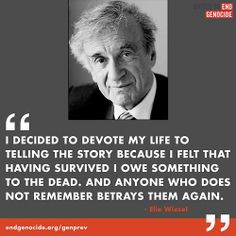A lex Goldberg, René Cassin Trustee remembers a personal encounter with Elie Wiesel, Holocaust survivor and Nobel Laureate, who died on 2 July
lex Goldberg, René Cassin Trustee remembers a personal encounter with Elie Wiesel, Holocaust survivor and Nobel Laureate, who died on 2 July
Some people move me, some influence me and others impress me. Few do all three. He did. I was pleased to have met Nobel Laureate Elie Wiesel once.
He came to address staff at our workplace just prior to receiving his honorary knighthood from Her Majesty the Queen. All testimonies from survivors are powerful but there was something that Wiesel was telling us that resonated with me.
For many years, I had been asked when we set up René Cassin: how we could both be universalist and yet base those values on the particular religion, culture and history of one people? How could we really use the Jewish experience to promote the rights of all?
Wiesel provides an answer to this: that memory serves a powerful purpose and as a result of that memory we need to stand up to hate and injustice wherever it might occur.
Monsieur René Cassin’s commitment to human rights came out of the crucible of the First World War and the peace movement that arose following the war that we were told would end all wars. He claimed that “it was really the War of 1914-1918 which upset my temporarily comfortable moral equilibrium”. A generation later, Wiesel’s views were forged out of the fires of hell on earth, of Auschwitz.
Wiesel said in his Nobel speech:
“Because I remember, I despair. Because I remember, I have the duty to reject despair. I remember the killers, I remember the victims, even as I struggle to invent a thousand and one reasons to hope. There may be times when we are powerless to prevent injustice, but there must never be a time when we fail to protest.”
Wiesel’s speech the day I met him focussed on a Jewish-based approach to human rights and responsibility. He was both concerned about the existential threat to the Jewish people and showing concern for all humanity facing injustice His experience, our experience, should direct us to protest wherever and to whomever it was necessary. His world was steeped in both a Jewish religious and cultural sphere but looking out to the rest of the world. That he struggled with his beliefs in public made him human. Whilst he and Cassin come to similar conclusions, Cassin speaks in a legal discourse whilst Wiesel speaks from the language of the covenantal Jewish tradition.
Both traditions have a place in René Cassin as an organisation. It is a broad coalition of Jews from the very religious to the very secular; of social democrats and libertarians; of men and women who have different outlooks on economics, society and religion; of lawyers, political activists, rabbis and human rights professionals and others but they all believe in one thing: life is precious and we must act in solidarity to protect it from harm.
Wiesel describes this solidarity between us best:
“We must take sides. Neutrality helps the oppressor, never the victim. Silence encourages the tormentor, never the tormented. Sometimes we must interfere. When human lives are endangered, when human dignity is in jeopardy, national borders and sensitivities become irrelevant. Wherever men and women are persecuted because of their race, religion, or political views, that place must – at that moment – become the center of the universe.”
René Cassin brings us together to ensure that we can do this together: using our experience to promote the rights of all. It was this message that I went away that day. He was able to articulate who I am, who we all are.
A light has gone out of this world. Wiesel claimed we are all immortal until we have gone. For me, he will live on through his ideas, his writings and those millions of lives he touched.
